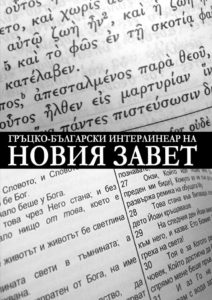Greek-Bulgarian Interlinear of the New Testament with Critical Apparatus: Addressed Problems and Proposed Solutions
Releasing our decade long work of “Greek-Bulgarian Interlinear of the New Testament with Critical Apparatus Based on Nestle-Aland 27/28 and UBS-5” in Bulgaria
After twenty some years in Bible translation and a decade long work on this current edition, we are happy to announce that on the 500th anniversary of the Protestant Reformation, our Greek-Bulgarian Interlinear of the New Testament will be presented in Bulgaria’s capital Sofia on All Saints Day 2017. The Greek Bulgarian Interlinear of the New Testament proposes the following solutions to the translation of the Bible in Bulgarian:
- A non-received test – Textus Haud Receptus
- Critical Edition of the Greek New Testament alike Revised Textus Receptus, Tischendorf, Westcott and Hort, von Soden, Nestle-Aland, UBS and SBL GNT
- Literal translation from Greek made word for word without dynamic equivalents
- Linguistic paradigm for repetitive parallel permutation structures in the Greek-Bulgarian translation alike form criticism of the Bible
- Analytical Greek New Testament with complete morphology of the words
Announcing our Greek-Bulgarian Interlinear of the New Testament with Critical Apparatus
 Releasing our decade long work of “Greek-Bulgarian Interlinear of the New Testament with Critical Apparatus Based on Nestle-Aland 27/28 and UBS-5”in Bulgaria
Releasing our decade long work of “Greek-Bulgarian Interlinear of the New Testament with Critical Apparatus Based on Nestle-Aland 27/28 and UBS-5”in Bulgaria
October 31, 2017 marks the 500th Anniversary of the Protestant Reformation. For this commemorative occasion, occurring only once every seven generations, we will be presenting a decade long work of ours in the capital Sofia. On All Saints Day 2017, the first edition of the Greek-Bulgarian Interlinear of the New Testament from the critical edition of GNT will be released. A symbolic stack of the first 95 copies arranged at the presentation will commemorate the work of the great reformers.
After working on the New Bulgarian Translation of the Bible since 1996 and more actively on the interlinear version for the past decade, we are hoping to address the following problems within the current revision of the Bulgarian Protestant Bible:
- Lack a definite orientation toward the critical edition of the Greek New Testament
- Revisions made on the basis of older revisions separating the current Bulgarian Revision from the true meaning of the Bible
- Diverse Biblical text tradition with undefined sources, base texts and methodology of revision
- Need of analytical Greek New Testament with proper morphology
- Interlinear edition, combining New Testament Greek and modern day Bulgarian based on the critical edition of the Greek New Testament
10 Things to Considering When Attempting to Express Cultural Sensitivity
- Be informed about the cultural differences of the people you are trying to reach because your good intentions may be misunderstood and even offend.
- Keep in mind you are not going on a site-seeing tour nor are you going to see a tourist attraction.
- Just because something makes sense in your language doesn’t mean it will make sense interpreted into a foreign language. Clichés are to be avoided.
- “One man’s meat is another man’s poison”
- “There are two ways to skin a cat”
- Consider that the people you are ministering to are not objects to be put on display in a savvy PowerPoint when returning home from your trip.
- Respect their right to privacy
- Ask permission to take pictures
- Just because you going or have been to a foreign country doesn’t make you a missionary. Don’t let one trip abroad make you forget who you are or make you arrogant.
- It is when you put yourself in the shoes of the people you are helping that you learn some do not even have shoes to wear. But this does not mean you are better than others.
- Aid is not the answer to all problems. Sometimes the people you are going to assist have real problems and spiritual needs. Socks don’t save souls.
- Aid should be given freely without any strings attached
- Don’t make them feel less by giving scraps
- Don’t make them feel like beggars
- It is not the power of earthly money that saves souls, but the power of a Heavenly Father.
- No amount of money will buy a soul
- Raised funds will not make you a missionary
- Being the missionary of the one-way ticket is a true test of your commitment towards the Kingdom
- There is a major difference between being “mission-minded” and being an international worker.
- The people you are ministering to are real human beings with dignity.
- Treat all with respect
- Don’t assume they know less than you or have less than you
Integration of Learning and Faith
 The believers within our Pentecostal tradition, despite some historical presupposition against education, have generally strived to receive and impart knowledge much higher than what secular science can offer. Our paradigm of integration of faith and learning has come from a personal experience of knowing God rather than scientific method, and in a way it has become our own scientific method of testing truth beyond our religious context into daily life.
The believers within our Pentecostal tradition, despite some historical presupposition against education, have generally strived to receive and impart knowledge much higher than what secular science can offer. Our paradigm of integration of faith and learning has come from a personal experience of knowing God rather than scientific method, and in a way it has become our own scientific method of testing truth beyond our religious context into daily life.
Similarly, being formed in the Spirit impacts our lives holistically, even the areas of our deepest doubts, our most serious suspicions and our greatest fears. It is there that true discoveries occur and where we realize that we know not the cosmos, the earth, our land, our families and even ourselves unless we first know God. Faith and learning become a personal spiritual quest, which reaches beyond just a Christian worldview or interpretation of faith and reason, to our very beings and change us.
In my case, faith and learning developed from my personal experience as a fifth generation Pentecostal believer and Spirit-filled minister. I can truly say that it has been a journey of reaching and a quest of finding, one that has changed me forever. Education did not make me a minister of the Gospel, nor did it have the power to do so, but it most certainly made me a better minister and a servant of the Kingdom.
Along the way, God used teachers who did much more than just deliver content in classrooms, but established the faith into our hearts and minds. In my journey, they have become road markers who knew God and made Him known to others. The passion to become personally such a milestone in the spiritual journey of others has been the greatest challenge for integration of faith and learning within both our ministry and personal Pentecostal experience. For our journey with God should not be without a destination or an end. It should be about actually getting there, at the place and reality where Scripture declares with most definite certainty that “we shall know.”
A Decade Ago Bulgarian Chaplaincy Association Gained Legal Status
 The Bulgarian Chaplaincy Association has finally received official legal status with the Bulgarian government, after battling courts throughout the country for the last four months. Global religious freedom watchdog FORUM 18 closely followed the case of chaplaincy ministry in Bulgaria recognizing its “underground” status and releasing an informative article about the current situation of chaplaincy in Bulgaria which can be found at: http://www.forum18.org/Archive.php?article_id=919
The Bulgarian Chaplaincy Association has finally received official legal status with the Bulgarian government, after battling courts throughout the country for the last four months. Global religious freedom watchdog FORUM 18 closely followed the case of chaplaincy ministry in Bulgaria recognizing its “underground” status and releasing an informative article about the current situation of chaplaincy in Bulgaria which can be found at: http://www.forum18.org/Archive.php?article_id=919
After a decade of ministry, the Bulgarian Chaplaincy Association held a national founding meeting in August, 2006 and submitted a petition for registration with the Bulgarian court. The purpose of the establishment was the legal representation of Bulgarian evangelicals who minister in various fields of chaplaincy despite legal limitations and open government restrictions. Their campaign for legalizing chaplaincy in the Bulgarian armed forces has formed “The Case of Underground Chaplaincy in Bulgaria.”
After months of legal battle, the Bulgarian Chaplaincy Association was officially registered through the Sofia Municipal Court on February 23, 2007. The result was made possible by a joint initiative of the Association’s establishing members, the representing legal team led by former Bulgarian presidential nominee, Ivan Gruikin with the assistance of legal council Latchezar Popov of the Rule of Law Institute and the Balkan Center for Law and Freedom.
Bulgaria Elects a Socialist President Again
 As we have previously proposed, this puts Bulgaria back on the “Red Light of 25 Years of Communism…” as in 2013 and 2014.
As we have previously proposed, this puts Bulgaria back on the “Red Light of 25 Years of Communism…” as in 2013 and 2014.
A socialist general from the Bulgarian Air Forces took by surprise the recent presidential elections winning +60% of the vote. He has already declared his pro-Russian preference asserting Bulgaria may pull out from NATO and the European Union.
As soon as loosing the elections, the ruling political party resigned the government early Monday morning. Bulgaria’s constitution now demands that the president gives mandate to the opposing Socialist Party, who will reject it due to insufficient presence in Bulgaria’s Parliament. The president then returns a second mandate to the ruling party, which they claim will turn down promptly.
A temporary government is then to be formed by the President and current Parliament, as it was the case in 2013 and 2014. In term, the democrats will hope to win with majority the new parliamentarian elections in 2017, which will be the 11th consecutive government elections in Bulgaria for the past 11 years since 2005:
2005 Parliamentary Elections
2006 Presidential Elections
2007 Municipal Elections
2009 Parliamentary Elections
2009 European Parliament elections
2011 Presidential Elections
2011 Local Elections
2013 Early parliamentary elections
2014 Early Parliamentary Elections
2015 Municipal Elections
2016 Presidential Elections
What does all this mean for the Church in Bulgaria?
Unstable political situation in Bulgaria with pro-Russian policies proposes a problem for the ministry of virtually all Protestants in the country. With a great probability to be voted in through a pro-Socialist government, a newly proposed legal measure bans any and all foreign organizations, companies and citizens from providing funding or donating to Bulgarian religious denominations. This would ban not only foreign physical and legal entities from funding Bulgarian religious institutions, but also companies with foreign ownership that are legally registered in Bulgaria. Using state funding for “illegal activities” by religious denominations will be sanctioned with prison terms of 3-6 years.
With these sanctions in mind, the new legal measure embodies the following rationale:
- Churches and ministers must declare all foreign currency money flow and foreign bank accounts
- Participation of foreign persons in the administration of any denomination is strictly forbidden
- Foreign parsons shall not be allowed to speak at religious meetings in any way shape or form especially religious sermons
- Anonymous donations and donorship to religious organization is not permitted
- Bulgarian flag shall be present in every temple of worship
- The new measure will block all foreign interference in the faith confessions and denominations in Bulgaria
ALL BOOKS CHRISTMAS SALE
In the past five years since 2011, we have authored over two dozen books related to our ministry and mission work in Eastern Europe. As several of the prints are now almost exhausted and second/third editions and several new titles are under way, we are releasing all currently available editions in a Christmas sale through the month of December. All titles are available at up to 30% off and Amazon offers free shipping and extra savings for bundle purchases.
Christmas Book Sale: The CASE of a NATO CHAPLAINCY MODEL within the BULGARIAN ARMY
In the past five years since 2011, we have authored over two dozen books related to our ministry and mission work in Eastern Europe. As several of the prints are now almost exhausted and second/third editions and several new titles are under way, we are releasing all currently available editions in a Christmas sale through the month of December. All titles are available at up to 30% off and Amazon offers free shipping and extra savings for bundle purchases.
Our book available on sale today is:
THE CASE OF A NATO CHAPLAINCY MODEL WITHIN THE BULGARIAN ARMY (Submitted to the Manfred Wörner Foundation)
 In April 2004, Bulgaria was officially accepted into the global structure of the North Atlantic Treaty Organization (NATO). The event followed a long series of historic developments that were accomplished despite the existence of highly antagonistic forces that opposed the very idea of Bulgaria’s membership in any Western alliance. Among these were internal and external political, economical and social factors that historically have forced the country to remain under the influence of the forces opposing the West.
In April 2004, Bulgaria was officially accepted into the global structure of the North Atlantic Treaty Organization (NATO). The event followed a long series of historic developments that were accomplished despite the existence of highly antagonistic forces that opposed the very idea of Bulgaria’s membership in any Western alliance. Among these were internal and external political, economical and social factors that historically have forced the country to remain under the influence of the forces opposing the West.
As the country of Bulgaria is now a member of NATO and awaits acceptance into the European Union in 2007, international experts are working with various government institutions and consultant agencies to create an atmosphere in which the Bulgarian mindset can experience a new national revival in the 21st century. NATO’s involvement in this process serves as a catalyst both for reinforcing Bulgaria’s infrastructure and attracting international interest in the country’s affairs. Issues concerning national security, military involvement, international relations, economical development and ethnic diversity are continuously and carefully taken into consideration. However, one issue still remains untouched neither by NATO’s official position in Bulgaria, nor by the Bulgarian government. This is the issue of faith.
Three reasons make such topic of relevant importance. First, Bulgaria claims traditional and historical religious belongingness to the Eastern Orthodox Church. Furthermore, the centuries of religious wars on the Balkans have formed a complete dependency on ethnic religiosity, making faith the prime factor for animosity, hatred and genocide. Finally, the issue of morale and morality in the armed forces remains open for any military unit and will need to be addressed sooner or later in the context of NATO’s presence in Bulgaria.
This research will show how the above issues could be resolved by the presence of a NATO paradigm for chaplaincy within the Bulgarian Armed Forces. The paper will explore the current developments of chaplaincy in Bulgaria on three levels: church, society and government. It will then present the case of “underground chaplaincy” in Bulgaria and provide an appropriate solution to be implemented through the newly established Bulgarian Chaplaincy Association. The conclusion will outline the benefits that can be achieved by a partnership between local NATO representatives and the Bulgarian Chaplaincy Association who combine efforts to restore the spirituality within the Bulgarian Army through the legalization of chaplaincy ministry within its structures.
Also important [click to read]:
- U.S. Department of State recognizes our chaplaincy efforts in Bulgaria
- Bulgarian Chaplaincy Association: Integration Proposal with Local NATO Programs
- Bulgarian Chaplaincy Association: Vision and Resolution
- Chronology of our role and involvement in developing Church of God chaplaincy in Bulgaria since 2001
- Master’s of Chaplaincy Ministry Program in Bulgaria Reflections
- The Past Decade of Chaplaincy in Bulgaria (2006-2016)
- Related Publications and Presentations by Cup & Cross Ministries International
Chronology of our role and involvement in developing Church of God chaplaincy in Bulgaria since 2001
History of Events
05/12 Anticipated Date for Graduation of the First Cohort of Master’s Program of Chaplaincy Ministry in Bulgaria
2011
09/11 – Master’s of Chaplaincy Ministry Program Module 3: Counceling Completed
07/11 – Master’s of Chaplaincy Ministry Program Module 2: Theology Completed
03/11 – Master’s of Chaplaincy Ministry Program approved by the Educational Committee of the Bulgarian Evangelical Theological Institute
01/11 – Master’s of Chaplaincy Ministry Program Continues
2010
10/10 – Master’s of Chaplaincy Ministry Program Module 1: Chaplaincy Completed
09/10 Master’s of Chaplaincy Ministry Program begins in Sofia, Bulgaria
06/10 Chaplaincy Conference and Master’s of Chaplaincy for Bulgaria
01/10 Proposal masters program finalized and submitted for approval to the Educational Committee of the Bulgarian Evangelical Theological Institute
2009
10/09 Bulgarian Chaplaincy Association holds an introductory chaplaincy course in Yambol, Bulgaria
2008
12/08 Family Seminar for Military Men and Women held in Yambol
11/08 Bulgarian Chaplaincy Association Annual Meeting
09/08 – Bulgarian Chaplaincy Associations noted in Church of God publications
06/08 – The Case of a NATO Chaplaincy Model within the Bulgarian Army released
06/08 – Celebrating 10 Years of Military Ministry in Bulgaria
2007
10/07 – Bulgarian Chaplaincy Associations Recognized by U.S. Department of State
07/07 – National Chaplaincy Conference in Yambol, Bulgaria
03/07 – Bulgarian Chaplaincy Association was officially registered
02/07 – Bulgarian Chaplaincy Association gains legal status
01/07 – Bulgarian Chaplaincy Assassination noted by international religious freedom watch dog Forum 18
2006
12/06 – Registration Rejected Bulgarian Chaplaincy Association by Bulgarian court
11/06 – A master program in chaplaincy ministry has been proposed for the Bulgarian Evangelical Theological Institute in Sofia
10/06 – Bulgarian Chaplaincy Association Founder’s Meeting in Sofia, Bulgaria
10/06 – A contextualized course for chaplaincy ministry is offered at the Bulgarian Evangelical Theological Institute in Sofia
08/06 – Bulgarian Chaplaincy Association’s Resolution No. 1 sets course toward chaplaincy in churches, education and government institutions
07/06 – National Chaplaincy Meeting in Yambol, Bulgaria
06/06 – Meeting with NATO Chaplains
05/06 – Cup & Cross Ministries submitted a research paper to NATO’s Manfred Wörner Foundation dealing with the case of underground chaplaincy within the Bulgarian Armed Forces
03/06 – A contextualized course for chaplaincy ministry was offered in Veliko Turnovo
02/06 – www.kapelanstvo.com was released to serve as the official website of the chaplaincy movement in Bulgaria
2005
10/05 – A national training seminar held in Veliko Turnovo
10/05 – The Bulgarian Chaplaincy Association was presented before the Bulgarian Evangelical Alliance
09/05 – Regional meeting in Nova Zagora which addressed the current issues
08/05 – A regional chaplaincy meeting in Sliven
07/05 – Publication of camouflage New Testaments and Bibles, some of which we distributed to Bulgarian army personal including the divisions currently serving in Iraq
2004-2001
- Chaplaincy Conference and Master’s of Chaplaincy
- Chaplaincy Course in Yambol, BULGARIA
- Bulgarian Chaplaincy Association Annual Meeting
- Family Seminar for Military Men and Women
- Cup & Cross Ministries in Church of God Publications
- The Case of a NATO Chaplaincy Model within the Bulgarian Army
- 10 Years of Military Ministry in Bulgaria
- Bulgarian Chaplaincy Associations Recognized by U.S. Department of State
- National Chaplaincy Conference
- Bulgarian Chaplaincy Association Gains Legal Status
- Chaplain Dees Visits Bulgaria
- Chaplaincy Course at the Bulgarian Evangelical Theological Institute
- Bulgarian Chaplaincy Association
- Meeting the NATO Chaplain
- National Chaplaincy Meeting
- Chaplaincy Developments in Bulgaria
- U.S. Bases in Bulgaria
- National Chaplaincy Meeting
- Chaplaincy in Bulgaria
- HEALTHCARE CHAPLAINCY IN BULGARIA
- Chaplaincy in Bulgaria
- Mission Bulgaria
Christmas Book Sale: Pentecostal Primitivism
In the past five years since 2011, we have authored over two dozen books related to our ministry and mission work in Eastern Europe. As several of the prints are now almost exhausted and second/third editions and several new titles are under way, we are releasing all currently available editions in a Christmas sale through the month of December. All titles are available at up to 30% off and Amazon offers free shipping and extra savings for bundle purchases.
Our book available on sale today is:
Prophetic and Persecuted Movement
![51DUWeyraBL._SY344_PJlook-inside-v2,TopRight,1,0_SH20_BO1,204,203,200_[1]](https://cupandcross.com/wp-content/uploads/2014/04/51DUWeyraBL._SY344_PJlook-inside-v2TopRight10_SH20_BO1204203200_1.jpg) Since a social movement that purposes liberation of the individual is always rejected by the present political and economic powers, Pentecostalism arises and develops in the midst of constant persecution and resistance. The constantly present struggle against evil, wrong and unrighteousness is the power that moves Pentecostalism to its final purposes. Once persecution disappears, Pentecostalism loses its original power and turns to a nominal religious organization, which continues to function and exist, however, outside the boundaries of its original purpose.
Since a social movement that purposes liberation of the individual is always rejected by the present political and economic powers, Pentecostalism arises and develops in the midst of constant persecution and resistance. The constantly present struggle against evil, wrong and unrighteousness is the power that moves Pentecostalism to its final purposes. Once persecution disappears, Pentecostalism loses its original power and turns to a nominal religious organization, which continues to function and exist, however, outside the boundaries of its original purpose.
The theology of the Persecuted Church is a theology of martyrdom. The context of persecution is a constantly present formational factor in Pentecostalism worldwide, and as such it is a universal characteristic of the movement. Only as such can Pentecostalism act in its God-given prophetic authority. In the same prophetic power in which John prophesies of the coming Baptiser with the Holy Spirit, the Early Pentecostals preached about the Fire from Heaven prior to the actual experience of the Holy Spirit baptism. The message of the movement then becomes a prophetic utterance under which the movement grows and develops to the point of fulfillment of the promise given by God.
20 more recent Pentecostal articles in light of the upcoming Pentecostal Sunday celebration:
- The Forgotten Azusa Street Mission: The Place where the First Pentecostals Met
- Diamonds in the Rough-N-Ready Pentecostal Series (Complete)
- 95th anniversary of the Pentecostal movement in Bulgaria
- Toward a Pentecostal Solution to the Refugee Crises in the European Union
- Historical and Doctrinal Formation of Holiness Teachings and Praxis among Bulgarian Pentecostals
- Pacifism as a Social Stand for Holiness among Early Bulgarian Pentecostals
- The Practice of Corporate Holiness within the Communion Service of Bulgarian Pentecostals
- Sanctification and Personal Holiness among Early Bulgarian Pentecostals
- First Pentecostal Missionaries to Bulgaria (1920)
- Historical and Doctrinal Formation of Holiness Teachings and Praxis among Bulgarian Pentecostals
- The Everlasting Gospel: The Significance of Eschatology in the Development of Pentecostal Thought
- Online Pentecostal Academic Journals
- What made us Pentecostal?
- Pentecostalism and Post-Modern Social Transformation
- Obama, Marxism and Pentecostal Identity
- Why I Decided to Publish Pentecostal Primitivism?
- Historic Pentecostal Revival Tour in Bulgaria Continues
- The Land of Pentecostals
- Pentecostal Theological Seminary Address
- A Truly Pentecostal Water Baptism
Bulgaria’s 2016 Presidential Election and Referendum Go to Runoff Ballot
Some 6.8 million Bulgarians are eligible to choose their new president who will replace incumbent Rosen Plevneliev after his five-year term ends in January. The election campaign focused mainly on the future of the European Union, relations with Russia and the threats from a possible rise in migrant inflows from neighboring Turkey
For the first time, voting in the presidential elections will be compulsory.
A tight race as expected between the two frontrunners, Parliament Speaker Tsetska Tsacheva, nominated by main ruling party GERB, and former Air Force Commander Maj Gen Rumen Radev, endorsed by the main opposition force, the Bulgarian Socialist Party (BSP). Tsacheva, pointed by Prime Minister Boyko Borisov in October, is expected to win the first round by a narrow margin.
- Gallup International has projected a 26.7% support for Radev, while the candidate of the main ruling GERB party, Tsetska Tsacheva, has ranked second, having mastered 22.5%
- Alpha Research, another pollster offering exit poll results, suggests Radev has garnered 24.8%, with Tsacheva’s support at 23.5%.
- According to Alpha Research, third, lagging far behind, is nationalist candidate Krasimir Karakachanov, at 13.6%.
- Fourth, surprisingly, comes businessman Veselin Mareshki (9.3%) who runs as an independent candidate, followed by Reformist Bloc’s Traycho Traykov at 7.1%.
 Government Elections in Bulgaria (2005-2015)
Government Elections in Bulgaria (2005-2015)
2005 Parliamentary Elections
2006 Presidential Elections
2007 Municipal Elections
2009 Parliamentary Elections
2009 European Parliament elections
2011 Presidential Elections
2011 Local Elections
2013 Early parliamentary elections
2014 Early Parliamentary Elections
2015 Municipal Elections
25 Years after Communism…
25 years in 60 seconds at the red-light…
I’m driving slowly in the dark and raining streets of my home town passing through clouds of car smoke. The gypsy ghetto in the outskirts of town is covered with the fog of fires made out of old tires burning in the yards. And the loud music adds that grotesque and gothic nuance to the whole picture with poorly clothed children dancing around the burnings.
The first red light stops me at the entrance to the “more civilized” part of the city. The bright counter right next to it slowly moves through the long 60 seconds while tiredly walking people pass through the intersection to go home and escape the cold rain. The street ahead of me is already covered with dirt and thickening layer of sleet.
This is how I remember Bulgaria of my youth and it seems like nothing has changed in the past 25 years.
The newly elected government just announced its coalition cabinet – next to a dozen like it that had failed in the past two decades. The gas price is holding firmly at $6/gal. and the price of electricity just increased by 10%, while the harsh winter is already knocking at the doors of poor Bulgarian households. A major bank is in collapse threatening to take down the national banking system and create a new crisis much like in Greece. These are the same factors that caused Bulgaria’s major inflation in 1993 and then hyperinflation in 1996-97.
What’s next? Another winter and again a hard one!
Ex-secret police agents are in all three of the coalition parties forming the current government. The ultra nationalistic party called “ATTACK” and the Muslim ethnic minorities party DPS are out for now, but awaiting their move as opposition in the future parliament. At the same time, the new-old prime minister (now in his second term) is already calling for yet another early parliamentarian election in the summer. This is only months after the previous elections in October, 2014 and two years after the ones before them on May 2013.
Every Bulgarian government in the past 25 years has focused on two rather mechanical goals: cardinal socio-economical reforms and battle against communism. The latter is simply unachievable without deep reformative change within the Bulgarian post-communist mentality. The purpose of any reform should be to do exactly that. Instead, what is always changing is the outwardness of the country. The change is only mechanical, but never organic within the country’s heart.
Bulgaria’s mechanical reforms in the past quarter of a century have proven to be only conditional, but never improving the conditions of living. The wellbeing of the individual and the pursuit of happiness, thou much spoken about, are never reached for they never start with the desire to change within the person. For this reason, millions of Bulgarians and their children today work abroad, pursuing another life for another generation.
The stop light in front of me turns green bidding the question where to go next. Every Bulgarian today must make a choice! Or we’ll be still here at the red light in another 25 years from now…










